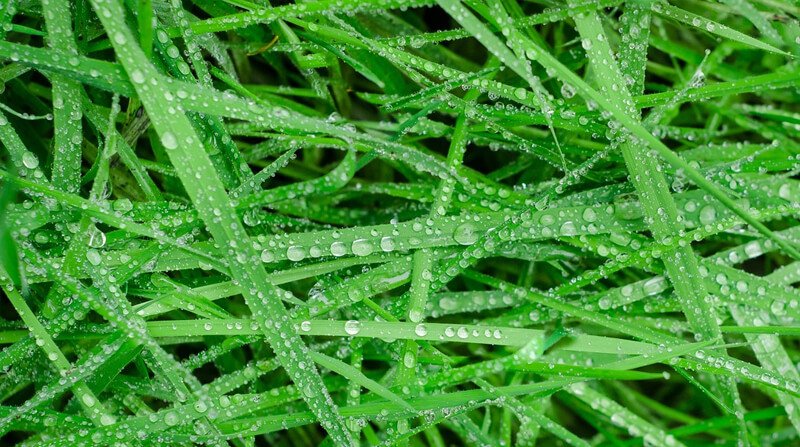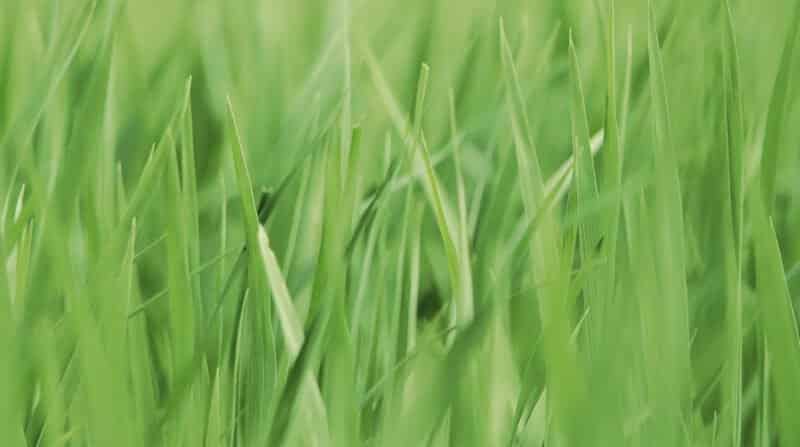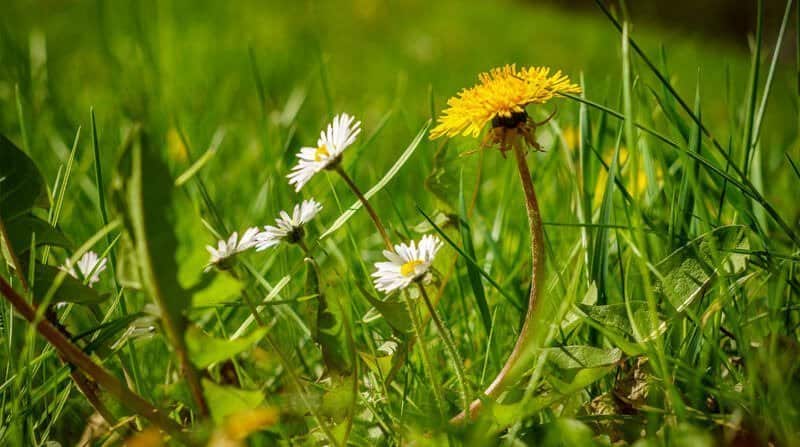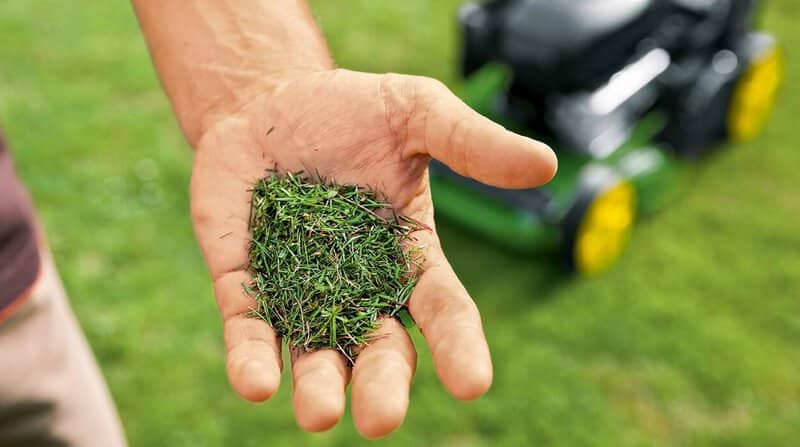Did you know every time you mow the lawn and chuck the clippings in the green waste bin, you’re wasting a valuable fertiliser?
By mulching those clippings, you keep vital nutrients in the lawn.
Not only that, but it can also save you a huge amount of time and what can amount to a significant amount of money too.
In this article, I’ll explain what mulching grass is and all the benefits it brings to you and your lawn.
I’ll also bust a myth or two about mulching and lawn thatch.
What is Mulching?
Mulching is very simple.
Instead of collecting grass clippings in a bag, they’re chopped up into tiny pieces and blown down into the base of the turf where they’re decomposed by the bacteria and micro-organisms which live in the soil.
How it Works
Think about it.
Each spring, summer, autumn and winter, you spend good money applying lawn feed.
The grass consumes it, along with water and sunlight which it photosynthesises to produce food. It then stores this food, moisture and nutrients in its leaves.
Then you come along and cut the grass, removing a portion of all this food, moisture and nutrients before throwing them in the bin.
Mulching the grass recycles these nutrients.
Mulching mowers cut the grass clippings up into tiny pieces and blow them back into to sward where they break down, re-fertilising the lawn.
The grass consumes these nutrients all over again and grows more. Then you cut it, mulch the clippings and return those nutrients and moisture back into the turf.
Again, the grass consumes them and so the cycle continues.
In fact, mulching grass clippings provides your lawn with 25% of its annual nitrogen requirement.
The Benefits of Mulching Grass
Mulching has several benefits.
It’s not only good for your lawn but it’ll save you time, money and it’s better for your environment.
Mulching Saves Time
Because you don’t have to keep stopping to empty the collection bag, you can just keep mowing.
It also means you don’t have to keep applying doses of fertiliser to replace the nutrients you’d otherwise throw away. You cut and fertilise all at the same time.
On the whole, it can save you up to 30% more time to do other things.
It Saves Money
Fertiliser can be expensive, especially if you have large lawns.
By mulching your grass clippings, you keep recycling and re-using the nutrients from just a single application. As a result, you don’t have to keep spending money on fertiliser.
Also, many councils in the UK charge for the privilege of having a green waste bin. If you only use your bin for grass clippings, you could save up to an additional £70 per year.
It Helps to Reduce and Control Lawn Thatch
Many gardeners assume that leaving grass clippings on the lawn adds to the build-up of thatch.
This couldn’t be further from the truth.
Fresh, organic matter causes a spike in microbial activity which is essential in the breakdown and control of lawn thatch.
When you mow and mulch on a regular basis you keep this microbial activity high. In turn, you keep lawn thatch at manageable levels.
Also, over-application of chemical fertilisers can cause thatch to build-up. By mulching, you’ll never over fertilise again.
The only time mulching could add to the latch layer is if you try to mulch overgrown grass. This is because the long grass often becomes tough and ‘stalky’ which makes it difficult to break down.
It’s Better For the Soil
When mulched grass clippings decompose, they add nutrients back into the soil.
They also form Humus, the organic component of soil which can help to loosen hard soils. This improves penetration of water, oxygen and nutrients into the soil.
It’s Better For the Environment
On the whole, mulching is far better for the environment.
Firstly, the production of chemical fertilisers produces waste. Mostly in the form of nitrates which are often washed into the water supply and consumed by the public.
Then there’s plastic packaging which we all know has a devasting impact on the environment. Distribution and the burning of fossil fuels etc.
The environmental impacts are incredibly far-reaching.
So not only does mulching your grass clippings save you time and money. Not only is it better for your lawn, but you can be happy in the knowledge that you’re not contributing to the environmental issues we all face.
When Mulching Isn’t a Good Idea
As beneficial as mulching is for you, your lawn and the environment, there are times when you should avoid it.
When the Grass is Wet

You should always avoid mowing wet grass whenever you can.
Not only is bad for your lawn but it puts extra load on your lawn mower. A mulching mower will be put under even more stress as it tries to chop up clumps of wet grass into tiny pieces.
And mulching wet grass doesn’t work anyway. It just sticks and clumps together which blocks the mulching plug. If it does find its way onto the lawn, the clumps smother the grass and you’ll need to clear it up.
So cut and mulch the grass at the best time of day.
Overgrown Grass

Mulching mowers are like giant food blenders. If you put too much food into a blender, it won’t blend very well.
If you mow an overgrown lawn, chances are you’ll mow too short and the mower won’t be able to cope with the volume of grass. Therefore it won’t be mulched very well.
In addition, overgrown grass is often quite coarse and difficult to break down. If you mulch overgrown, coarse grass and leave it on the lawn, then you risk adding to the thatch layer.
If You Have Weeds or Weed Grasses in Your Lawn
 If you have weeds or weed grasses in your lawn you should avoid mulching at all costs. It will spread those weeds all over your lawn and make the problem ten times worse.
If you have weeds or weed grasses in your lawn you should avoid mulching at all costs. It will spread those weeds all over your lawn and make the problem ten times worse.
Weeds like Dandelions and weed grasses like Annual Meadow Grass produce massive amounts of seeds.
If you have weeds in your lawn, bin the clippings.
Do I Need Any Special Equipment For Mulching?
You can buy dedicated mulching lawn mowers as well as mowers with mulching plugs or attachments.
Mulching mowers are the best mowers for the job because they blow the clippings into the base of the sward.
Mulching Grass With Other Types of Mower
If you don’t have a mulching mower, you can mulch clippings with other types of mower.
However, you’ll need to cut the grass regularly in order to produce clippings which are small enough to leave on the lawn without causing problems.
This could mean mowing every day or two during the growing season.
Robot mowers aren’t technically mulching mowers. However, they cut the grass on a daily basis, producing tiny clippings which are left on the lawn to decompose.
The groundsmen and women who look after golf courses mow the greens and fairways daily with cylinder mowers and always leave the clippings on the surface.
You can even mulch with a mechanical push mower.
In Conclusion
Mulching grass is very beneficial for your lawn as well as your pocket and the environment.
And although it’s a mulching mower or lawn mower with a mulching attachment are best, you don’t strictly need one.
You’ll just need to mow more regularly which will benefit your lawn in other ways too.
If you’ve never mulched before, give it a try over the next year. You’ll be amazed at how much time and money you save and you’ll also see the difference in your lawn.


Are there any fertilizers that are compatible with mulching?
Organic fertilzers like seasol or chook poo or other organic nutrients that also feed microbes in the process. Chemical fertilizers can disrupt or kill the microbes in the soil and lawns can become so dependant on them Its like an addiction.